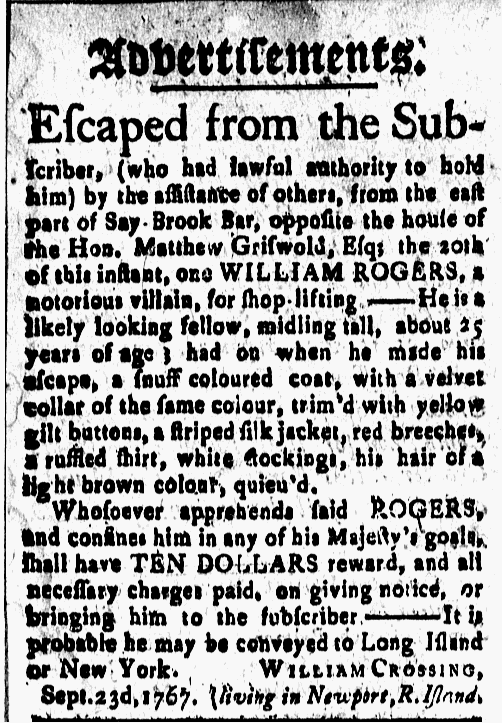What was advertised in a colonial American newspaper 250 years ago today?

“WILLIAM ROGERS, a notorious villain, for shop lifting.”
In the fall of 1767, William Crossing placed an advertisement in the New-London Gazette to warn readers that William Rogers, a “notorious villain,” had escaped from his custody. According to Crossing, he had “lawful authority to hold” Rogers “for shop lifting.” Advertisements concerning theft appeared regularly in newspapers throughout the colonies. Sometimes retailers indicated that goods had been stolen from their shops. Other times advertisers reported that thieves took items from their homes. Theft, rather than purchasing, became an alternate means for some colonists to participate in the consumer revolution in eighteenth-century America.
Crossing described a particular kind of theft: “shop lifting.” While it came as no surprise that this crime existed in colonial America, the use of that particular term to describe it made me wonder when “shoplifting” entered the English lexicon. According to the Oxford English Dictionary, “shoplift” was used as a noun as early as 1665 and as a verb as early as 1756 (a little over a decade before it appeared in today’s advertisement). Describing “one that steals out of shops” as a “shoplift” has fallen out of use, now described by the OED as historical and rare. The term “shoplifter,” on the other hand, has survived from the 1660s and is still in common use today.
Although “shoplift” and “shoplifter” described petty criminals in Restoration England, the OED does not include any examples of “shoplift” as a verb until nearly a century later, when it appeared in the July 22, 1756, edition of London’s Public Advertiser. The newspaper reported on fabrics stolen from a linen draper’s shop. The OED also indicates that the word “lyft” had been in use as early as 1585. In 1824, Sir Henry Ellis, a prominent antiquarian and eventually principal librarian of the British Museum, noted the meanings of several words associated with theft in Early Modern English: “ffoyste is to cutt a pocket, nyppe is to cut a purse, lyft is to robbe a shoppe.” In its original iteration, “lyft” did not need further clarification to indicate that it referred to stealing goods from a shop while pretending to be a customer. The origins of the term “shop lifting” date back to the time of Shakespeare, long before the transatlantic consumer revolution of the eighteenth century.
